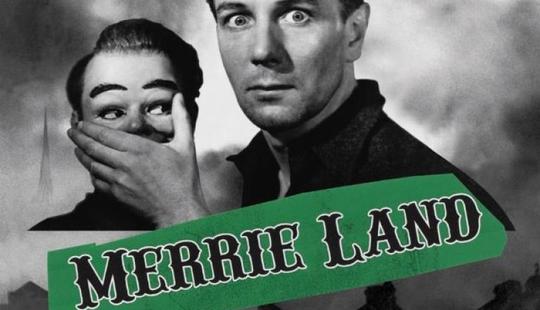Drowned In Sound
80
“And especially from every shire's end of England; the holy blissful martyr for to seek, that them had helped them when they were weak”. So begins Merrie Land, the second album by the ‘supergroup’ (a horrible phrase) of Damon Albarn, afrobeat legend Tony Allen, Clash bassist Paul Simonon and Verve/Blur side-man Simon Tong, which technically doesn’t have a name but is usually referred to as The Good, The Bad and the Queen. The quote comes from Geoffrey Chaucer’s fourteenth century book The Canterbury Tales, a contemporary examination of all the strata of English life. It’s clear from the outset that Albarn has his mind in a similar place. While Allen and Simonon give the album its skittish, dubby musical backbone, this is very much Albarn’s record; the whole thing drips with the melancholy Englishness he loves so much, both in the evocative imagery of the lyrics (““Are we green, are we pleasant?... We’re a shaking wreck where nothing grows””) and the end-of-the-pier organ that fuses with the rhythm section’s afro-dub and Tong’s sparse guitar to create something moody, distinctive and quite, quite beautiful.
Albarn has described Merrie Land as something of a successor to Blur’s Parklife (he also said this about Think Tank and The Good, The Bad & The Queen), and while the musical parallels are few, the thematic ones are clear. We’re asked to look at the country and the people around us, like Chaucer did in the 1300s, as Blur did in the Nineties, and try to understand the human landscape. Brexit is on its way, and Albarn is searching for answers. Just as travelling around Hong Kong and the east informed Blur’s The Magic Whip, and touring America gave us Gorillaz’ The Fall and The Now Now, Albarn wrote Merrie Land after a personal pilgrimage around modern Britain, steering clear of the big cities and his beloved London in favour of English seaside towns, Welsh valleys and the industrial North. We go with him to Blackpool, where much of the album was written in sight of the Tower; to Banbury, to Preston to Southend-on-Sea. Places where, ya know, ordinary people live. The people whose hard work, as Albarn puts it on the title track, “puts the money in the pockets of the few and the fortunate.
The album is peppered with British touchstones that predate the Brexit era. ‘Gun To The Head’ drops Blackpool pub names and talks about “animal lovers” (and not in the Suede sense), ‘Nineteen Seventeen’ journeys to the cemeteries of France with their “thousands of white crosses”, Albarn deliberately echoing Rupert Brooke’s patriotic war poem ‘The Soldier’ (“I leave a little bit of England in a field in france”). The Smiths are invoked with a throw-away line about being “the son and heir” on ‘Ribbons’, while ‘Great Fire’ is messy nights out in seaside towns, ‘Lady Boston’ makes beautiful use of a Welsh-language male-voice choir and ‘The Truce of Twilight’ has “lions and unicorns” and ”the smell of cut grass”. Merrie Land is continually lapped by the grey waves of the dis-united Kingdom.
The real skill here is in how well the record acknowledges the turbulent times in which is was written. Sometimes it does so overtly, though only occasionally with real anger as on the title track’s pointed jab at the “few and the fortunate that crowd the school benches and jeer at us all because they don’t care about us”. Mostly, though Albarn and co’s disquiet is baked into the unsettling moods on display, turning on a sixpence from absolutely lovely to extremely weird. It’s exemplified by the cover, a still from the 1954 British horror classic The Dead of Night featuring a terrifying ventriloquist's dummy; it’s there in the menacing lurch of ‘The Last Man To Leave’, a song which connects musically with Albarn’s forays into theatre on and . It’s there in the quesy nightmare folk soundscapes of ‘The Great Fire’, with its altercations on b-roads, its “joyous alcoholism” and its plea to “enjoy it while you can.
Rich and accomplished; beautifully played and immaculately conceptualised, Albarn’s latest trip from FitzRoy to Faeroes and back, via Dogger and Dover, is a drizzle-soaked deep-dive into a fractured land and fractured people. One of the quiet highlights of the year.

Fri Nov 16 07:22:48 GMT 2018